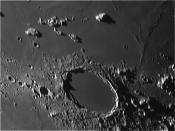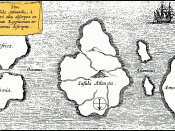INTRODUCTIONAtlantis was a large island in the Western Ocean (the ocean to the west of the known world) near the Pillars of Hercules, now believed to be the Straits of Gibraltar. Despite the vast number of sources available on Atlantis, two sources peaked the teamsÃÂ interest above all. These sources include Poseidon, and Plato.
The first source involves Poseidon. Accordingly, after dividing the Earth into sections, the gods gave the island of Atlantis to Poseidon, who divided it into 10 providences. Each providence was ruled by one of PoseidonÃÂs 10 sons, and the eldest, Atlas (after whom the island was named) was appointed king over all (Parada, 1997). Over time, AtlantisÃÂ rule extended beyond its borders over Libya to Egypt and into Europe through to Tuscany. Despite, (or perhaps because of) the abundant natural resources, the citizens of Atlantis became greedy and decadent, further setting out to conquer the rest of the Mediterranean.
Consequently, Athens and its allies defeated them, and ultimately, as punishment for their greed, the gods destroyed the island and all its inhabitants.
The next source is from the works of Plato. The first recorded accounts of Atlantis, which is said to have been engulfed by the ocean as the result of an earthquake, appear in Timaeus and Critias, two dialogues by Greek philosopher, Plato (Encarta, 2006). According to the account in Timaeus, the island was described to Athenian statesman Solon by an Egyptian priest, who maintained that Atlantis was larger than Asia Minor and Libya combined. The priest further revealed that a flourishing civilization had reputedly centered on Atlantis about the 10th millennium BC, and that the nation had conquered all the Mediterranean peoples except the Athenians. In Critias, Plato records the history of Atlantis and depicts the nation as a utopian commonwealth. Although PlatoÃÂs descriptive...


